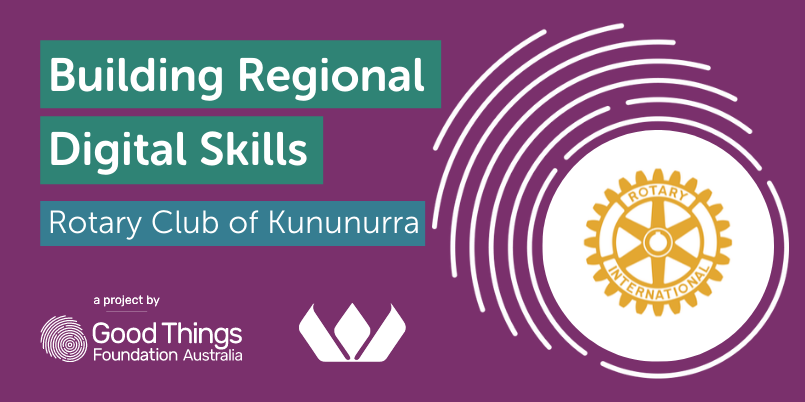
When the Rotary Club of Kununurra joined the Building Digital Skills in Regional Areas Pilot, they knew that they wanted to give back to the local economy while empowering residents to shop online safely.
“The closure of our local Target left a bit of a gap in the goods and services available in our community. However, we’ve got lots of great small businesses who’ve stepped in and stepped up,” says Natika Hawes-Wright, lead Digital Mentor for Rotary Club of Kununurra’s Building Digital Skills in Regional Areas Pilot program.
“So [with the pilot], we can help our local community find the goods and services that they need by using technology, but find them locally.”
As part of this commitment to investing in the local economy, Rotary Club of Kununurra spent part of the funding provided by Wesfarmers on chamber dollar vouchers. Pilot participants were taught how to browse for the goods they needed online from local businesses, and then could use these vouchers to make the purchase.
Teaching people the skills to browse and shop online also means making sure they feel safe and confident while doing so. As such, safety also became a core focus. Using Digital Mentors and digital skills resources from the Be Connected, the Rotary Club of Kununurra’s pilot program went to Gawooleng Yawoodeng Aboriginal Corporation and Kununurra Community and School Library to hold friendly, discussion-based sessions on how to stay safe when shopping online and using the internet.
“The conversation is directed whichever way the people at the session want it to be directed, and there’s always safety and conversations around how to stay safe, what scams are doing the rounds,” says Natika.
“There have been lots of cases of vulnerable people in communities being taken advantage of and scammed,” says Natika. “So it is pretty important for us to be able to impart some of the awareness on people that might not have the confidence and the digital literacy levels to spot some of the potential risk.”
“Digital literacy is fast becoming as important as standard literacy.”

Natika says that it isn’t just what people learn at the sessions that is important – but how they use and share these new digital skills with others and create broader awareness in their community.
“For me, it’s the impact that one little bit of information has. Once one person knows, they are prepared to go out and say ‘did you know that…’ to others. What I’m trying to create is that peer-to-peer [interaction] and open up that it’s ok to have these conversations,” says Natika.
“That’s how we learn about technology – we talk to our friends, our family, and our colleagues about what and how we use technology.”
Whilst the Building Digital Skills in Regional Areas Pilot has now wrapped up, Rotary Club of Kununurra is keeping the conversation around digital literacy going with regular open Tech Talk sessions at the local library. They are continuing to champion digital literacy skills in their community through conversations and encouragement to try new technologies and ways of doing things.
You can read how the Building Digital Skills in Regional Areas Pilot has made a difference across more regional communities in our case study series below.
Keep in the loop with news, grant announcements, events and updates in our Good Things newsletter and learn how to get involved in closing the digital divide.